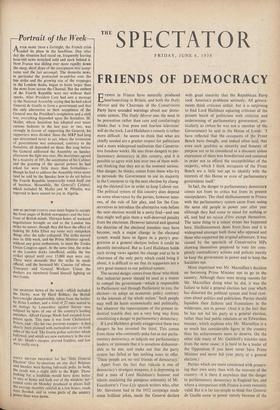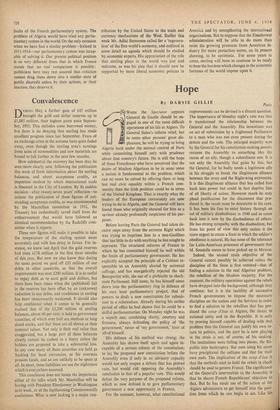FRIENDS OF DEMOCRACY - 0 VENTS in France have naturally produced
heartsearching in Britain, and both the Daily Mirror and the Chairman of the Conservative Party have sounded warnings about our demo- cratic system. The Daily Mirror sees the need to be prevention rather than cure and comfortingly thinks that 'a free press and fearless television' will do the trick. Lord Hailsham's remedy is rather more difficult : he seems to think that what are chiefly needed are a greater respect for politicians and a more widespread realisation that Conserva- tive freedom works. He sees three dangers to par- liamentary democracy in this country, and it is possible to agree with him over two of them with- out thinking that they are at the moment serious. One danger, he thinks, comes from those who try to persuade the Government to use its majority in the Commons to rig the next election by chang- ing the electoral law in order to keep Labour out. The political system of this country does depend on some observance by the parties, however tenu- ous, of the rule of fair play, and for the Con- servatives to introduce the alternative vote before the next election would be a nasty foul—and one that might well gain them a well-deserved penalty from the electorate. However tattered and ignored the doctrine of the electoral mandate may have become, such a major change in the electoral system would have to figure in a party's pro- gramme at a general election before it could be decently introduced. But as Lord Hailsham holds such strong views against the change and as he is chairman of the only party which could bring it about, it is difficult to see that its supporters are a very great menace to our political system.
The second danger comes from those 'who think that industrial power should be used as a means to compel the government—which is responsible to Parliament and through Parliament to you, the electors—to adopt an economic policy contrary to the interests of the whole nation.' Such people may well do harm economically and politically, but whatever the repercussions of the present in- dustrial trouble they are a very long way from constituting a danger to parliamentary democracy.
If Lord Hailsham grossly exaggerated these two dangers he has invented the third. This comes from those who constantly poke fun at our parlia- mentary democracy, or cifficule our parliamentary leaders, or insinuate that it is somehow dishonour- able to be one, and make out that the party system has failed or has nothing more to offer. `These people are no real friends of democracy.'
Apart from the fact that ridicule is one of democracy's strongest weapons, it is depressing to find a man of Lord Hailsham's humour and talents emulating the pomPous solemnity of Mr. Eisenhower's Time-Life speech writers who, after Mr. Stevenson had in the 1952 campaign made some brilliant jokes, made the General declare with great sincerity that the Republican Party took America's problems seriously. All govern- ments think criticism unfair, but it is surprising to find Lord Hailsham equating criticism of the present batch of politicians with criticism and undermining of parliamentary government, par- ticularly as (when' he was not a member of the Government) he said in the House of Lords : 'I have reflected that the occupants of the Front Bench have thought, and indeed often said, that even such qualities as sincerity and honesty of purpose are to be considered at a discount unless expression of them was bowdlerised and censored in order not to offend the susceptibilities of the majority, which I think occupants of the Front Bench are a little too apt to identify with the interests of this House or even of parliamentary governMent itself.'
In fact, the danger to parliamentary democracy comes not from its critics but from its present manipulators. The chief disillusionment in France with the parliamentary system came from seeing the same old people in power year after year although they had come to stand for nothing at all, and had no raison d'etre except themselves. The same thing to a minor extent has happened here. Disillusionment dates from Suez and it is widespread amongst both those who opposed and those who supported the original adventure. It was caused by the spectacle of Conservative MPs showing themselves prepared to vote for com- pletely contradictory actions and policies merely to keep the government in power and to keep the Socialists opt.
More important was Mr. Macmillan's decision on becoming Prime Minister not to go to the country. Although there were strong reasons for Mr. Macmillan doing what he did, it was the failure to hold a general election last year which has distorted the political system and bred cyni- cism about politics and politicians. Parties should liquidate their failures and frustrations in the wilderness, not in power. (And it is the fact that•he has not led his party at a general election, rather than bad public relations or an Edwardian manner, which explains why Mr. Macmillan is a so much less considerable figure in the country than his achievements seem to deserve. On the other side many of Mr. Gaitskell's troubles stem from the same cause; it is hard to be a leader of the Opposition if you have never been Prime Minister and never led your, party at a general election.) Parties which are more concerned with preserv- ing their own unity than with the interests of the country—it is there if anywhere that the danger to parliamentary democracy in England lies, and where a comparison with France is even remotely valid. But it is far too simple to think that General de Gaulle came to power merely because of the faults of the French parliamentary system. The problem of Algeria would have tried any parlia- mentary system in the world. On the only occasion when we have had a similar problem—Ireland in 1911-1914—our parliamentary system was incap- able of solving it. Our present political position is so very different from that in which France stands that no real comparison is possible : politicians here may rest assured that criticism cannot drag them down into a similar state of public discredit unless by their actions, or their inaction, they deserve it.











































 Previous page
Previous page